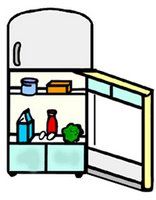Weight
 Depending on the mode of transportation weight can be a very important when choosing your food and assembling the menu. Fresh and canned food tends to be heavy; on the opposite side are dehydrated, freeze-dried, and powdered dishes.
Depending on the mode of transportation weight can be a very important when choosing your food and assembling the menu. Fresh and canned food tends to be heavy; on the opposite side are dehydrated, freeze-dried, and powdered dishes.I usually bring some fresh fruits/vegetables that can last for a while and be used in several meals. When assembling menu I try to use the heaviest items during first couple of days (you are still full of energy and those extra pounds in your back-pack do not seem as heavy as they would towards the middle of the trip).
Looking for the commonly used ingredients in powdered form and substituting fresh produce with dry alternatives could not only significantly decreases the weigh of the “meal” but extend the lifetime of the ingredient. Ex. powdered milk and orange juice instead of the fresh ones, powdered mash potatoes instead of the fresh ones.
Removing the original packaging and repackaging portions insures that you don’t carry any extra food or useless cardboard.
Fuel (cooking) consumption
 is directly linked to the weight you carry. If your light food takes hours of simmering you’ll end up carrying extra pounds of fuel. Fuel consumtion is also linked to time spend cooking. Personally, I can cook for hours, be it at home or outdoors, but some people see camping food as an escape from a routine of everyday meal preparation. “Instant” mixes are perfect for camping because they tend to be light and do not require too much fuel and cooking time.
is directly linked to the weight you carry. If your light food takes hours of simmering you’ll end up carrying extra pounds of fuel. Fuel consumtion is also linked to time spend cooking. Personally, I can cook for hours, be it at home or outdoors, but some people see camping food as an escape from a routine of everyday meal preparation. “Instant” mixes are perfect for camping because they tend to be light and do not require too much fuel and cooking time.When choosing any type of pre-packaged food pay attention to the cooking time indicated on the package. If the basmati rice included in the Asian Stir-Fry mix requires 10 minutes of boiling time – substitute for some instant rice.
Keep in mind that simmering takes less fuel then cooking on maximum power.
Time spend cooking at home and at the camp
 One of the way to decrease the time spend cooking at the camp-site is to precook and dehydrate full dishes or some components of the meal at home. If you don’t want to spend any time next to your stove when camping, try the Freezer Bag Cooking. Ingredients are cooked at home, dehydrated, and then combined into different meals. I am yet to try FBC so I can’t give any comments about the taste of those meals, however I usually don’t have too much time pre-cooking dishes before the trip, and I do not yet have access to a dehydrator.
One of the way to decrease the time spend cooking at the camp-site is to precook and dehydrate full dishes or some components of the meal at home. If you don’t want to spend any time next to your stove when camping, try the Freezer Bag Cooking. Ingredients are cooked at home, dehydrated, and then combined into different meals. I am yet to try FBC so I can’t give any comments about the taste of those meals, however I usually don’t have too much time pre-cooking dishes before the trip, and I do not yet have access to a dehydrator.I try to use pre-packaged dry mixes combined with the variety of dehydrated vegetables to assemble the dishes. I also vary the time-consuming meals with more straightforward ones since spending hours next to the stove is not an option when you get to your locations late at night, or when camping in someone’s backyard.
Taste
 Even though any food tastes better outdoors, a variety of different tastes is always good. One simple way of making your food “tastier” is by using spices. Dried herbs work perfectly for camping because they don’t weight much and a little bit goes long way. Bring the basic kit of your favorite spices: basil, oregano, cumin, chili powder, cinnamon, garlic salt….. My little secret is the spice mixes that I prepare at home so that I don’t have to look for each particular spice in the bottom of my food-bag.
Even though any food tastes better outdoors, a variety of different tastes is always good. One simple way of making your food “tastier” is by using spices. Dried herbs work perfectly for camping because they don’t weight much and a little bit goes long way. Bring the basic kit of your favorite spices: basil, oregano, cumin, chili powder, cinnamon, garlic salt….. My little secret is the spice mixes that I prepare at home so that I don’t have to look for each particular spice in the bottom of my food-bag.When preparing the menu for camping, rely on what you like to eat at home. One advice that I’ve found recently is NOT to try the camping food at home, because the meal you might not love in the comfort of your home on Friday night would taste much better outdoors when you are hungry after the day of hiking/kayaking/mountaineering.
Shelf life
 Don’t bring anything that might go bad fast. When bringing fresh fruits/vegetables choose those types that can withstand the heat and do not get damaged easily. If going for long trips plan to use most of the fresh produce during the first 2-3 days.
Don’t bring anything that might go bad fast. When bringing fresh fruits/vegetables choose those types that can withstand the heat and do not get damaged easily. If going for long trips plan to use most of the fresh produce during the first 2-3 days.Dehydration substantially increases the shelf life of products.
Trash
 Unless the trashcans are available in the camping area, you would have to bring all the packages and garbage with you. Re-package the food at home (see 10 tips for food preparation before leaving) and avoid “messy” meals. All the ingredients should transport easy without leaving stains or leaking in your backpack.
Unless the trashcans are available in the camping area, you would have to bring all the packages and garbage with you. Re-package the food at home (see 10 tips for food preparation before leaving) and avoid “messy” meals. All the ingredients should transport easy without leaving stains or leaking in your backpack. Another fact that should be kept in mind is that dehydrated fruits/vegetables loose some of the vitamins and nutrients as opposed to the freeze-dried meals (commercial packages available in most outdoor stores and on-line). This might not be an issue for a weekend trip, but is important for long expeditions.
Update: the reason why dehydrated food looses some of its nutritional value is the fact that it is usually consumed before being fully rehydrated. It also "survives" cooking and bits of it pass through the digestion system right to the bowels where it gets fully rehydrated and ferments. For more information about cooking visit this site (tons of interesting and useful information).
Outdoor cooking is about finding the balance between these aspects and your cooking abilities. Just like with home cooking, don’t be afraid to experiment and try new stuff. Sooner or later you would have a collection of your favorite fool-proof recipes and even if camping cooking won’t become your passion, it won’t be a dreadful experience. 












Well...
ReplyDeleteI thought it was sad that such a sharp post had no "shlappy" comments, so...
Nice apron there!... (oh boy..*hides in shame*)
he he he
ReplyDeletewell it's time to write a new post..... what would it be about.....